|
|
|
JG'S RAP Page


In the midst of a role in the movie "Above the Rim" and a Platnum album "Me against the world," Tupac's rising career was snagged. He was brought up on sexual assault charges by a woman he met at a nightclub. Hours before Tupac would be found guilty, Tupac was robbed at gun point by men whose intent and purpose is still uncertain. Tupac was eventually released at over $1 Million in bail.
After his release, Tupac answered his critics by releasing his best
album, "All eyes on me." "All eyes on me" has currently sold around 6 million
copies, which is revolutionary for a double cd. Especially in Hip Hop music.
As the album climbed the charts, Tupac also completed work on two films,
one entitled "Gridlock." While on his way to do charity work, Tupac Shakur
was assassinated by the bullets of unknown gunmen on September 13, 1996.


Snoop Doggy Dogg
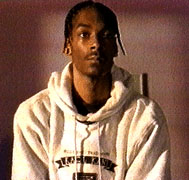
CALVIN BROADUS acquired his nickname because of his resemblance to that
popular Peanuts character Snoopy the Dog. His father said that Snoop "had
a lot of hair on his head as a baby and looked like a little dog." His
parents split up when he was still a boy; he lived with his mother and
two half-brothers, and spent his free time rapping with a friend, Warren
Griffin, who would later find fame as rapper Warren G. Snoop was a good
student and athlete in high school--several basketball programs recruited
him--but he fell in with the L.A. Crips gang, started selling drugs, and
wound up in jail soon after he graduated high school. Snoop claims that
fellow inmates told him to get his life together because he had talent.
Over the next three years, Snoop bounced in and out of prison, but
he eventually decided to devote himself to rap. His buddy Warren G. gave
Snoop his first break. Warren played Snoop's tape for his brother, who
just happened to be the godfather of rap, Dr. Dre. Dre loved Snoop's tape,
and put him on the soundtrack of the film Deep Cover and on his 1992 album
The Chronic. This album went on to become one of the top-selling rap albums
in history, and Dre and Snoop scored a megahit with "Nuthin' But a 'G'
Thang," with the chorus, "Bow wow wow, yippee yo yippee yay." By this time,
Snoop's reputation as a rapper was so great that his first solo record,
Doggystyle, released in 1994, spawned several hit singles, including "Gin
and Juice," "Doggy Dogg World," and "Who Am I (What's My Name)." He was
voted best rapper by Rolling Stone readers and critics in their annual
poll, and he won an MTV award for best rap video with "Doggy Dogg World."
In the midst of all this success, Snoop was arrested and charged with
the murder of Philip Woldermariam, a rival gang member, who was gunned
down on August 25, 1993, in a drive-by shooting in L.A. Snoop and his bodyguard,
McKinley Lee, were both charged in the murder. Ironically, right around
the time the charges hit Snoop released a single and a long-form video
entitled "Murder Was the Case." Snoop and Lee were both found not guilty
of murder.
The November of 1996 release of Snoop's second album, Tha Doggfather,
showed that his scrape with the law did little to tone down his gangsta
cockiness on songs like "Ride 4 Me," though "Snoop Bounce" (based on Zapp's
1980 hit "More Bounce to the Ounce") did suggest a more playful side. It
would seem fair to suggest that Snoop needed a bit of levity in his life
at that moment; Tha Doggfather was released just three months after the
death of his friend and labelmate Tupac Shakur, to whom Snoop dedicated
the album.
Tha Doggfather debuted at No. 1, and Snoop's personal problems seemed
to have abated, but the press and the public were more engaged by the darker
stories emerging from the rap world than by the new album of its premier
performer. Questions surrounding Shakur's murder cast a pall over the entire
Death Row Records camp, and by early 1997, serious legal problems facing
label head Suge Knight were making headlines. Snoop did perform two songs
("Snoop's Upside Ya Head" and "Vapors") on Saturday Night Live in January,
and he added to his old-school credibility by bringing along the Gap Band's
Charles Wilson, who has since become his de facto band leader.
Plans called for Snoop to take to the road in the spring of 1997, but
the death in March of the Notorious B.I.G. caused him to cancel his tour
out of respect, and, undoubtedly, fears for his own safety, given the murder
of two peers in the span of seven months. Yet as Tha Doggfather slipped
from the charts, providing Snoop with the perfect excuse to lay low, he
instead opted to accept a high-profile slot on the summer's Lollapalooza
lineup. By June, Snoop was making headlines for accepting his first movie
role (in a film tentatively titled The Real) and for marrying his longtime
girlfriend Shantay Taylor. He also took time out for a pair of collaborations
(with Tony Toni Toné's Raphael Saddiq and Rage Against the Machine),
which will appear on a new EP titled Doggumentary, and to record a track
for the highly successful Men in Black soundtrack.
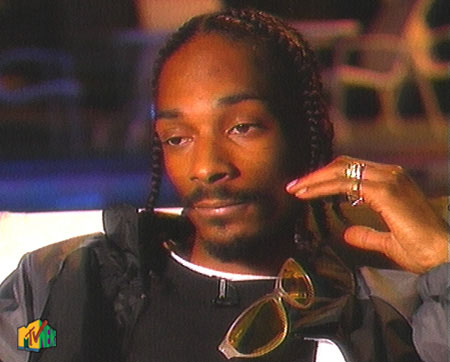

DMX
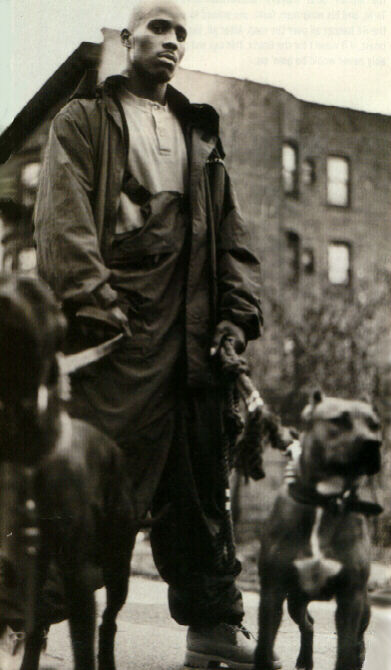
Dmx the dog of the squad was born in Baltimore Maryland in the projects.
His family knew in the area he lived that he would get in trouble alot
so he moved to Yonkers New York with his aunt. There he showed a talent
in music. He was signed to Columbia Records where his first album was brought
out called Born Loser. Peepz wasn't feeling him then in 1996..so he had
to come out wiht something rougher and harder. That's when he started appearing
on artists songs such as LL cool J, John forte, The Lox , Ma$e and many
more. Peepz was feeling him then so he knew he had to come out with something
strong to keep him image alive. That's when 98 came around and he brought
out It's Dark and Hell is Hot was under Def Jams Records which sold 3 million
copies. Now he is one of the best Eastcost rappers alive. Lets welcome
Dmx to our world...Where my doggs at.


Coolio
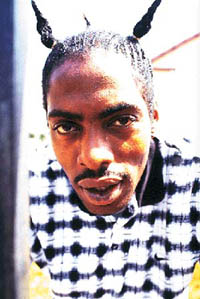
In 1995, Gangsta's Paradise, Californian rapper Coolio's colossal elegy
to the black blank generation, zoomed from nowhere to Number One across
the globe. And now the monster's parent album, a fire breathing lexicon
of post-industrial urban lifestyle and ghetto funk, looks set to harvest
a bumper cash crop for the man Medusa from Compton.
Sharing his couch in the refined environs of Marylebone Street, I wonder
whether he drinks Carling Black Label. "Sure, I like a brew," raps Coolio.
"you need a brew and a blunt to keep your mind in front." I mention the
enormous mountains of cash that he'll be carting home next year. He shakes
his antennal locks, rolls his jetlagged totally shagged thirtysomething
eyes and drawls like Plato reinvented as a West Coast beach bum.
"Money means very little to me," he confesses. "Mainly I mourn for
things...like the collapse of American society. I grew up in what now seems
to be a golden age. My childhood was rich with colour, culture and love.
I'm reminded of the African proverb 'It takes a village to raise a child.
'That's how it was. We had black villages, white villages and everybody
proud of their colours and traditions. You might do something, someones
else's mother finds out and whups your ass on the spot. I grew up thinking
the world was cool, each to their own with a little interaction. And then
came crack...changed the whole social chemistry fo the USA."
Coolio the crackhead wasn't a particularly bad man. He didn't kill
anybody or anything like that. He was just a slightly mad, positively sad,
two-bit rapper who wasn't bad enough to make the grade. Every day he would
rise and hustle and smoke rocks in Compton, a drap district of Southern
California made notoriously chic by inventors of gangsta rap, NWA.
"My life went from somewhere to nowhere real fast," says the erudite
black man (whose video parades Michelle Pfeiffer as comely scenery) " and
boy, was it easy. Everybody was doing it. See, we thought it was like weed,
we were smoking it. Hell, we didn't think about the social fallout. Now
there's no love out there, just cold blooded killers. Young black men raised
by crackhead mothers in homes with no love. They're unlikely to develop
into model citizens and good neighbours! " It's so powerful and addictive
though, that by the time we realised what it was...it was too late for
a lot of us. I broke my addiction but I had to do some weird shit to get
my head off it."
Coolio joined the Californian fire fighters. Rising well before the
crack of dawn, his 15-man crew would board a huge SWAT van and race to
do battle with the elements seven days a week.
"Fire-fighting is the hardest physical labour known to man," he winces
in reflectin, "but it was the only way to focus my mind away from drugs.
It was like being on a football team. I was totally fulfilled. Doing the
shifts, working out, running every day, eating three squares, sleeping.
It was regimented...like a boot camp but it was what I needed.
" You had to be fit. You're looking to cut a firebreak ten feet wide
and a mile long...and the one thing you ain't got is time. The chain saw
goes in first to cut the big shit. You move in with axes with holes in
them to smooth and loosen the topsoil. You've got to get down to bare earth,
remove all the combustibles." The respect earned by Coolio's 1994's platinum
debut album It Takes A Thief has already been eclipsed by the quolent thunder
of Gangsta's Paradise.
In the hip-hop hall of fame Coolio's portrait hangs alongside Snoop,
Dr Dre and Tupac.
"I don't use base words without context," he reflects, "and because
I don't agree with the maxim that murder and mayhem sells, people have
cast doubt on my ability to reach the top of the tree. Well, my premise
has always been that if I have the chance to be heard by millions of people,
I'm damned if I'm not gonna say something worth hearing."
Is there more room at the top these days because everybody else is
in jail? I ask and, and he chuckles in righteous vindication. Coolio the
chronic asthmatic requires medication every day of his life but he still
retains a passion for cigarettes and blunts. "It's a crazy world, ain't
it?" he smiles like a man due to net $10 million in 1996. "When a man can
give up crack but not cigarettes."


Jermaine Dupri

"I didn't make this album to prove that I can rhyme with a Nas, a Slick
Rick, or a Jay-Z," says Jermaine Dupri (JD), discussing his solo debut
album, Life In 1472. The idea of his own solo album as an act of artistic
expression heralds back to 1984, when, at the tender age of 12, Jermaine
first began to search out other groups to produce. "I felt like I knew
in my head what the public wanted and I couldn't totally give it to 'em
at the time. I didn't think I was a full-fledged artist like that."
14 years later, he's ready.
Life In 1472 features a who's who of rap luminaries trading verses
with JD on a wide variety of topics. "Turn It Out" is a lyrical manifesto
with Queensbridge griot Nas rapping over a sampling of the hip-hop classic
"Davy DMX." " Fresh" finds the incomparable Slick Rick and Dupri turning
out ribald and raunchy freak tales with reserved flair, and "Money Ain't
A Thang" is a Jay-Z-assisted exchange of high life boasts that moves back
and forth like a well-paced tennis match.
But such stellar pairing is nothing new for the artist and So So Def
Recordings CEO, who, at 26, has a production résumé including
Usher, Mariah Carey, Aretha Franklin, TLC, LSG, Aliyah, Mase, MC Lyte and
Cam'ron; not to mention his own ultra-phenomenal, multi-platinum successes
with Kris Kross and So So Def Recordings' Da Brat and Xscape. Dupri's accomplishments
are truly awe-inspiring. This year, he's helped Usher sell 3 million albums
(and counting), he wrote and produced "You Make Me Wanna... " and "Nice
and Slow," the first and follow-up platinum-selling No. 1 singles from
Usher's triple platinum album My Way. Last year saw JD's remix of Dru Hill's
"Sleeping In My Bed" rocket to the No. 1 spot after Dru's original version
dropped from the coveted position. In 1996, Dupri became the first producer
to reach No. 1 on Billboard's Pop, R&B, and Rap charts with different
singles. Going back a little further, JD's Midas touch transformed Da Brat
into the first female solo rapper to achieve platinum status while his
stardust magic helped Kris Kross sell more than 8 million records . . .
At the age of three, Jermaine Dupri would attend studio sessions of
the seminal funk band Brick, with his father -- music industry impresario
Michael Mauldin -- who then served as the group's road manager. Michael
would also practice drums in the house. Soaking up his environment like
a thirsty sponge, JD soon began to imitate his father's actions, smacking
the sticks with a wanton abandon that showed much more than mere promise.
JD was shortly given his own set on which to wreak tympanic havoc. By the
time he was five, Jermaine could play the drum tracks for the entire Brick
catalog.
Immersing himself in the urban phenomena mushrooming all around him,
JD began to educate himself in the various disciplines of hip-hop culture.
He won local talent shows by popping and locking his body in the kinetic
Origami known as b-boying or breakdancing, eventually going on to perform
with Diana Ross, Herbie Hancock, Cameo before becoming the opening act
on the legendary Fresh Fest Tour with hip-hop superstars Whodini, Run-DMC,
Grandmaster Flash and the Fat Boys.
JD had yet to hit his teens.
Highly autodidactic and high off of his experience on the road, JD
began writing rhymes and creating musical tracks in his room for days at
a time. "I didn't even have any equipment," he recalls. "I had a drum machine.
I would keep all the bass-lines and samples in my head, so when I got to
the studio, I could just tell somebody to play it for me." He realized
at this point that he was not quite ready to become a full-fledged solo
artist. His focus changed, but his determination did not. "I was trying
to pump the fact that I was the youngest producer in the game," he says.
"I wanted the world to know that I was 12 years old and making records."
"I knew what I was doing," he continues. "I was determined to make
sure that we got that deal signed. 'Cause when I was doing it, there wasn't
anyone else except Hurby Luv Bug and Teddy Riley. They had a bunch of groups
back in the day and I just said that's what I want to do."
But things didn't go as planned. Silk Tymes Leather met with little
response in the marketplace. Yet, it provided an invaluable experience
and a boost of confidence. JD now knew that others believed in him as much
as he believed in himself. He also realized his penchant for finding raw
talent. He saw Chris Kelly and Chris Smith in Atlanta's Greenbriar mall
and transformed them into the übersuccessful Kris Kross. Around the
same time, he saw a trio of young girls named Second Nature and knew they
had enormous potential. Unfortunately, he was only able to focus on one
group at a time. "I can't say that I was too young," says a reflective
Dupri, "but I didn't think I could work both of them and get them both
record deals." He decided to let Second Nature go. They eventually got
a deal with LaFace Records under the name TLC.
Slowly but surely, the countenance of contemporary Black music has
been reshaped by Jermaine Dupri's sounds --sleek and smooth, classy yet
classical, lithe and slender, clean and crisp, yet always constructed with
girders of jagged spontaneous soul. He creates pop ditties with soul, bone-hard
joints packed with mainstream accessibility, and R&B tunes with one
eye to the future and the other to the past. He scribes lyrics for the
Jeeps and pens ballads for the fireplace.
Life In 1472 promises to be another monumental chapter in the book
of Dupri's life. "I have no doubt that with the heavy hitters on my album
it's sure to be one of the greatest albums of '98," he says. Artists on
the album include Mariah Carey, Keith Sweat, Bone Thugs-N-Harmony, Too
Short and DMX with help behind the boards from Derek "D-dot" Angelettie,
DJ Premiere and DJ Quik and Li'l Kim and Mase on the unrolling bob of "You
Get Dealt With."
"Writing is just a hobby," says JD. "Right now, I got this gut feeling,
this thing in my body that I gotta be on the radio. That's what a lot of
people don't understand. Once the money's here, the money's here. Now you
just gotta keep doing what you gotta do."
And what JD's gotta do is live life. Life In 1472.
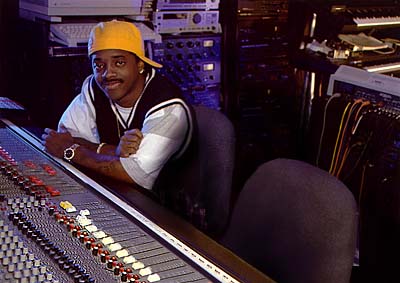 /
/

Links:
Jermaine Dupri
Tupac
